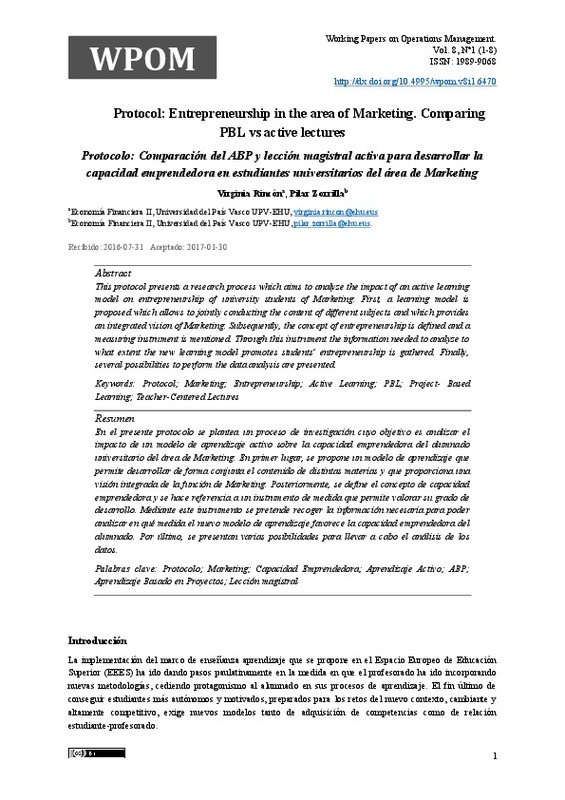Andreu-Andrés, M. Á., & García-Casas, M. (2014). La evaluación de la participación en equipos de trabajo universitarios (Assessment of participation in higher education team working activities). WPOM-Working Papers on Operations Management, 5(1), 1. doi:10.4995/wpom.v5i1.1758
Bigelow, J. D. (2004). Using Problem-Based Learning to Develop Skills in Solving Unstructured Problems. Journal of Management Education, 28(5), 591-609. doi:10.1177/1052562903257310
Chau, K. W. (2005). Problem-based learning approach in accomplishing innovation and entrepreneurship of civil engineering undergraduates. International Journal of Engineering Education, 21(2), 228-232.
[+]
Andreu-Andrés, M. Á., & García-Casas, M. (2014). La evaluación de la participación en equipos de trabajo universitarios (Assessment of participation in higher education team working activities). WPOM-Working Papers on Operations Management, 5(1), 1. doi:10.4995/wpom.v5i1.1758
Bigelow, J. D. (2004). Using Problem-Based Learning to Develop Skills in Solving Unstructured Problems. Journal of Management Education, 28(5), 591-609. doi:10.1177/1052562903257310
Chau, K. W. (2005). Problem-based learning approach in accomplishing innovation and entrepreneurship of civil engineering undergraduates. International Journal of Engineering Education, 21(2), 228-232.
Doppelt, Y. (2007). Assessing creative thinking in design-based learning. International Journal of Technology and Design Education.
Geitz, G., Joosten-ten Brinke, D., & Kirschner, P. A. (2016). Are marketing students in control in problem-based learning? Cogent Education, 3(1). doi:10.1080/2331186x.2016.1222983
Hernández, R.; Pe-a, I.; Guerrero, M.; González-Pernía, J.L.; Ruiz Navarro, J.; Cabello Medina, C.; Medina Tamayo, R.; Hoyos Iruarrizaga, J.; Gutiérrez-Solana, F. (2014). Informe Global Entrepreneurship Monitor Espa-a 2013. Red Espa-ola de Equipos Regionales GEM.
Klebba, J. M., & Hamilton, J. G. (2007). Structured Case Analysis: Developing Critical Thinking Skills in a Marketing Case Course. Journal of Marketing Education, 29(2), 132-139. doi:10.1177/0273475307302015
Lam, D. (2004). Problem-based learning: An integration of theory and field. Journal of Social Work Education, 40(3), 371-389.
Malicky, D. M., Lord, S. M., & Huang, M. Z. (2007). A design methodology for choosing an optimal pedagogy: The pedagogy decision matrix. International Journal of Engineering Education, 23(2), 325-337.
Marin-Garcia, J. A. (2017). El grupo como espacio de aprendizaje: Curso de formación del profesorado. Instituto Ciencias de la Educación. Universitat Politècnica de València
Marin-Garcia, J. A., Martínez Gómez, M., & Lloret, J. (2009). Enhancing motivation and satisfaction of students: Analysis of quantitative data in three subjects of industrial engineering. WSEAS Transactions on Advances in Engineering Education, 6(1), 11-21.
Nouwen, J., & Van Hoorick, V. (2014). Learning by doing through elaboration of challenging marketing plans. In L. G. Chova, A. L. Martinez, & I. C. Torres (Eds.), Iceri2014: 7th international conference of education, research and innovation (pp. 4562-4567)
Revell, A., & Wainwright, E. (2009). What Makes Lectures ‘Unmissable’? Insights into Teaching Excellence and Active Learning. Journal of Geography in Higher Education, 33(2), 209-223. doi:10.1080/03098260802276771
Scarbrough, H., Bresnen, M., Edelman, L. F., Laurent, S., Newell, S., & Swan, J. (2004). The Processes of Project-based Learning. Management Learning, 35(4), 491-506. doi:10.1177/1350507604048275
Shadish, W., Cook, T., & Campbell, D. T. (2002). Experimental and quasi-experimental designs for generalized causal inference. Boston New York: HOUGHTON MIFFLIN COMPANY.
Sherwood, A. L. (2004). Problem-Based Learning in Management Education: A Framework for Designing Context. Journal of Management Education, 28(5), 536-557. doi:10.1177/1052562904265773
Smith, G. F. (2005). Problem-Based Learning: Can it Improve Managerial Thinking? Journal of Management Education, 29(2), 357-378. doi:10.1177/1052562904269642
Tena León, M. (2009). Aprendizaje y evaluación de la competencia transversal "creatividad e innovación" en el marco de una titulación adaptada al EEES. Congreso Univest 2009. Girona, Espa-a.
Tena León, M. (2010). Aprendizaje de la Competencia Creatividad e Innovación en el marco de una titulación adaptada al Espacio Europeo de Educación Superior. Formación Universitaria, Vol. 3, No. 2, pp. 11-20.
Villa, A.; Poblete, M. (2010). Aprendizaje basado en competencias: una propuesta para la evaluación de las competencias genéricas. Universidad de Deusto.
Watts F., García-Carbonell A.; Andreu-Andrés, M.A. (2013). Innovation Competencies Development. INCODE Barometer and User Guide. Turku University of Applied Sciences.
[-]








